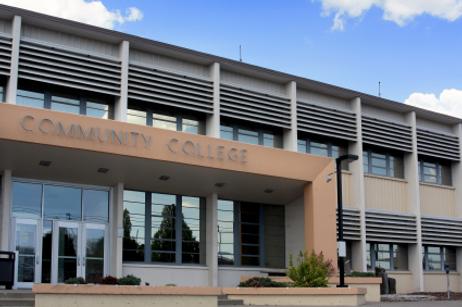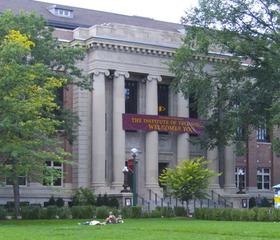Many things factor in one’s selection process when choosing a community college. After briefly introducing you to these factors, we will discuss each factor in detail in turn. Here are some of the selection criteria that students consider when investigating community colleges:
- Why are you going to school?
- If you plan to continue with a four-year degree, what type of articulation agreements does the community college have with four-year colleges?
- What type of coursework do you need?
- Is cost an issue?
- Do you want or need a virtual campus?
- Do you have a four-year college in mind?
- Location, Location, Location!
- On-Campus Activities
- Student Support
Let’s look at each of these factors in detail now that we have introduced them to you.
Most people attending a four-year college go with the sole target of getting a four-year bachelor’s degree to help prepare them for their professional careers. But with community colleges, students attend for different purposes. Many students attend to get a two-year degree. There are, however, other end goals for students including transferring to a four-year college, getting a high school diploma, remedial education including “English as a Second language, personal growth, professional certification, or workplace required continuing education.” While nationwide statistics were not available, numbers are available by looking at records that BellevueCommunity College in Bellevue, Washington, collected from 2002 to 2004 on the purposes that their students reported for their enrollment intent. The following statistics are from their Fall 2004 student population (the statistics do not total 100% probably due to rounding down of their reported numbers)
- Academic Non-Transfer (2-year program): 48%
- Academic Transfer: 1%
- High School Diploma/GED: 9%
- Personal Development: 9%
- English as a Second Language: 4%
- Professional/Technical: 22%
- Continuing Education: 0%
- Other/General Studies/Undecided: 6%
The major question should be why are you going to school? Correspondingly, what do you need from your community college? While it makes sense to pick a community college that is close to you, an important thing to decide first is what you need the community college to do for you. Do you want to get a two-year degree, need a particular career certificate, or plan to transfer to a four-year school?
Community colleges vary in their offerings. To find out what community colleges match your needs, go online. College Board offers a College Matchmaker (https://bigfuture.collegeboard.org/college-search) you can use to look at what programs community colleges offer. With this interactive tool, you can select that you want to limit your search results to two-year colleges. After that, you can manipulate the selection criteria so that search results will report only community colleges meeting your criteria.
If you plan to continue with a four-year degree, focus on the articulation agreements.
Many community colleges talk up the possibility for their students to continue on to a four-year college by transferring their undergraduate credits. If this interests you, make sure you read the fine print. Look at the articulation agreements that the community college has in place with four-year colleges. Articulation agreements are formal understandings that “partner” four-year colleges have with local community colleges. The agreements basically say that “Yes, we will give the student full credit in this program of study for these specific courses that they take at your community college.”
If you have ever talked to a transfer student, they probably may have grumbled about how they were not able to transfer all their credits. Hence, they had to spend additional time taking required courses at their new college, since their old coursework did not satisfy all their undergraduate requirements. You do not want to be in this position.
Even if you are not sure what major you want to have if you have a good idea of the four-year colleges that you would like to transfer to after you get your associate’s degree, look into the community college’s articulation agreements with those four-year schools.
For example, in Fairfax, Virginia, George Mason University works closely with Virginia community colleges to help make the process smooth for transfer students. On their website, George Mason states “Admitted students who have earned an AA, AS, or AA&S degree at a Virginia community college will have completed Mason’s general education requirements with the exception of any specific courses required in the major and the upper-level general education requirements of English 302 and Synthesis.”George Mason University goes on to spell out what they recommend students take at a Virginia community college while working on their associate’s degree depending on what major they plan to transfer into at George Mason.
This allows students to get not only the most credit that they can but also, by closely aligning their community college coursework with what their “traditional” students complete, help make the best prepared for upper classwork. Start with the four-year school you want to go to and find out what articulation agreements they have with nearby community colleges. Always use the documentation from the four-year college as opposed to the community college since the four-year college will have the final say when you finally transfer your credits.
What type of coursework do you need?
We have already talked about how some community colleges track better with certain four-year colleges. If you have more than one community college that meets your needs in terms of articulation agreements or programs offered, you may want to compare the schools down to their actual coursework. For example, if the four-year college requires a history general elective, you may want to read the community college’s catalog to see what history courses they offer and whether some interest you more than others.
If you are attending a community college for specific technical training, continuing education coursework, remedial courses, “English as a Second Language” courses, etc., then you should also look specifically at the community college’s catalog to see what they offer.
Is cost an issue?
Many people attend community colleges for the first two years to save money overall. Consider, however, that there may be a variance in tuition costs at the community college level as well, especially when comparing community colleges across different states and when comparing public community colleges with private community colleges.
Most public community colleges in the same state will have similar tuition fees. J. Sargeant Reynolds Community College in Richmond, Virginia charges $80.55 per semester credit hour for in-state students and $245.60 for out-of-state students attending 2006 summer courses. Northern Virginia Community College in Fairfax, Virginia, costs $81.98 per credit hour for Virginia students and $247.03 per credit hour for out-of-state students attending summer 2006 courses.
If we compare attending a public community college in Connecticut versus attending in Virginia, we see that the Connecticut community college student will pay out about 70% more per credit hour, regardless if they are paying in-state or out-of-state tuition. For example, at Naugatuck Valley Community College in Connecticut, tuition costs $148.50 per credit hour for Connecticut students and $435.50 per credit hour for out-of-state students attending in the 2005-2006 school year. Of course, getting a better deal isn’t simply a matter of moving across state lines. You must the domicile guidelines set forth by each state. Each state has its own domicile guidelines. For example, Virginia’s domicile guidelines were found on the State Council on Higher Education’s website, from a link off of the J. Sargeant Community College’s website. Virginia’s State Council on Higher Education specifies that you must have lived in Virginia for twelve months before classes start to qualify for in-state tuition rates. If, however, you have some time before you go to college, you may want to consider community colleges in other states and weigh the benefits and cons of your situation.
While many community colleges are public, some are private. In Buffalo, New York, TrocaireCollege is an independent two-year college. The tuition rate in 2006 for students going part-time is $390 a credit hour. This is regardless of whether you have a New York state domicile since Trocaire is not a state public community college. For cost comparison purposes, the 2006 tuition rates at ErieCommunity College, in Buffalo, New York, is $121.00 per credit hour for ErieCounty residents and $242.00 a credit hour for “out-of-county” and out of state residents.
Do you want or need a virtual campus?
You may want to look into how much of the coursework is available through distance learning. Distance learning can include “old-school” off-line courses that you work on at home by yourself or videos that you watch. Some schools offer online courses that use the Internet as the classroom. Taking courses online can help busy professionals achieve their academic goals.
Do you have a four-year college in mind?
If you have a four-year college in mind, consider picking the community college based on its relationship with the four-year college. Find the local community college with a solid articulation agreement with the four-year college. While many people choose a community college close to their home, this is one case where going with the community college with the tightest articulation with the four-year college can make sense come transfer time.
Location
If you have already applied your other selection criteria and you still have more than one community college to choose from, all things being equal, you may want to focus on location to find a community college close to where you live or work. Since many community college students end up working part-time to support themselves while going to school or they are already working full-time when they decide to return to school, the idea of picking a community college close to their work can be a practical concern.
On-Campus Activities
Many community colleges have limited on-campus activities or sponsored events when compared to four-year colleges. Still, you may want to consider which community colleges support on-campus activities aligned with your personal interests.
Student Support
Unlike on-campus activities, student support is an area where many community colleges excel. Since their purpose is, for many people, to bridge that gap that separates people who can go to college and those that cannot (based on a number of different factors), many community colleges have very strong student support in place. Examples include counseling, tutoring, daycare, and financial aid. If you have a special need, investigate how well the community college can meet your need.
This video explains support services at Glendale Community College.
In Conclusion
Picking the community college that will work the best for you is easy after you decide and prioritize the selection criteria that will help you make your decision. After you work out what should factor into your decision, research the answers so that you aren’t making your decisions in the dark. With your selection criteria and research, you should easily find the community college that is right for you, given your circumstances and goals. Good luck!
Questions? Contact us on Facebook. @communitycollegereview































































